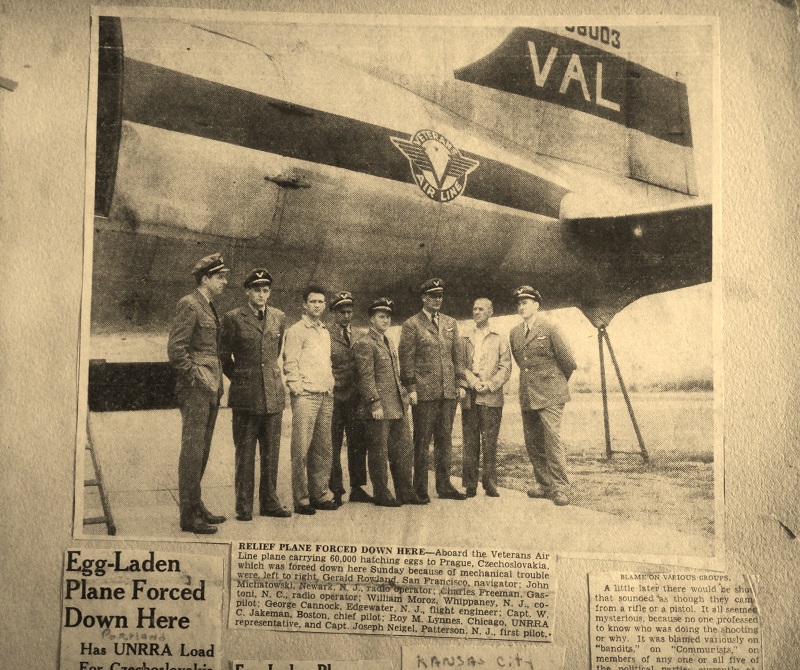60,000 war-relief hatching eggs delayed
in Portland ME
Heavy rain disrupted essential radio communications en route from Newark on the third UNRRA flight to Prague on 8 June 1946. Fortunately, still over U.S. soil, Captain William Jakeman landed the DC-4 in Portland, Maine. The Crew and five tons of crated hatching eggs awaited a Veterans Air radio tech from Newark for repairs. Wait time unknown, but the Crew left in ample time to protect their cargo.

Good News. Press Covered Landing and Unique Cargo.
The Portland unplanned landing brought out the press and press photographers. No surprise there. The good news is that one of Captain Jakeman’s family saw the article and clipped it from the paper. In 2017, Jake Jakeman, the Captain’s son, shared it with me.
First, the forced landing story was not known and rather amazing. But, the photo? It was pure treasure! Until that day, five Crew members had only been named in various sources, but never identified in photos. Here they all are including their current home towns and Crew responsibilities:

- Gerald Rowland, San Francisco, Navigator
- John Michatowski, Newark, N.J., Radio Operator
- Charles Freeman, Gastoni, N.C., Radio Operator
- William Moroz, Whippaney, N.J., Co-Pilot
- George Cannock, Edgewater, N.J., Flt. Engineer
- Capt. W. C. Jakeman, Boston, Chief Pilot
- Roy M. Lynnes, Chicago, UNRRA representative
- Capt. Joseph Neigel, Patterson, N.J., First Pilot
Challenges worth noting.
This event draws our attention to a few of the critical factors embedded in each UNRRA contracted flight:
- Consistent temperature-control for delicate, soon-to-hatch poultry eggs. For airborne, on the ground, and varying flight levels in between, temperature maintenance was to be 55 degrees. Veterans Air technicians developed the heating system to accomplish that before the first UNRRA flight departed in April 1946. The Flight Engineers took over the assignment from there…and, likely, the rest of the Crew!
- Potential delays. Captain Jakeman commanded an earlier May flight to Warsaw. He described flying in weather as bad as he had ever encountered in his thousands of flight hours. But landing to wait-out the storm was not an option because, depending upon how long they were forced to wait, the eggs could become unfit for hatching.
- Few-to-no accurate navigation aids. That called upon the Navigators to be map-less Barnstormers.
- War-torn runway conditions. Before overhead arrival in Prague and Warsaw, runway conditions were unknown – and, even then, uncertain. Each trip demanded exceptional skills from the Cockpit Crew.
A few other Posts go into greater details about these subjects. But this seemed like a good opportunity to draw attention to them.
